Centrists win Latvia vote, Russian parties on back foot
Russian-speaking parties on back foot
03 October, 11:03Harmony came first in the last election in 2018. The results showed other centrist parties coming second and third and just one party associated with Russian-speakers, Stability!, scraping past the threshold to enter parliament with 6.75 percent. The Russian-speaking minority in Latvia makes up around 30 percent of the population. - 'Rally around the flag' - Latvians voted in the shadow of neighbouring Russia's invasion of Ukraine, with many concerned about Russian aggression and expansionism.
National security and support for Ukraine were key issues for many voters, as well as the need for stability in this country of 1.8 million people on the eastern edge of the European Union and NATO. "Neither I nor my government nor my country reacts on fear," Karins told AFP on Saturday after polls closed. "We will continue to invest in our own defence as a NATO member state," he added. Karins said he expected the consultations on forming a new government to begin on Monday. Political expert Marcis Krastins said before the vote that Karins was "most likely" to be named prime minister, depending on how many smaller parties would support him. "Russians invading Ukraine helps Karins to secure voters in Latvia because in such times people tend to rally around the flag," Krastins said. - Storm 'will only get stronger' - "The results are not bad but what is not good is that Stability!... will be in parliament," Yevgenijs, an 18-year-old student in Riga, told AFP. One voter said he made his decision based on the conflict raging nearby. "I am 83 years old, I lived through Soviet and German military occupations... I am today making my choice depending on which party supports Ukraine the most against the Russian invasion," Verners Karklins told AFP. After voting, President Egils Levits said: "People are seeing that we are already in a storm, but it will only get stronger, and it's making people think more about their future and their country's future." Ahead of the vote, Levits had warned people against backing politicians in the Russian-speaking community who "hesitated to clearly state who is the aggressor and who is the victim at the outset of the Russian invasion". - 'Clear choice' - Dominated over the centuries by Teutonic knights, Swedes, Poles, then Russians, Latvia gained independence in 1918 before finding itself under Soviet occupation in 1944-1990. Along with inhabitants of nearby Poland and their Baltic neighbours Lithuania and Estonia, many Latvians feel their country is vulnerable even though it is in the EU and NATO. The outgoing government has shown strong support for Ukraine, hiked defence spending and worked towards greater energy security. Some Russian speakers in Latvia say that official attitudes towards them have deteriorated since the war started and feel their linguistic and cultural identity is being challenged. The Harmony party condemned Russia's invasion but has been less vocal about accusations that Russian forces are carrying out human rights atrocities. But Nils Usakovs, an MEP from Harmony, said the party had suffered a loss of support because of its criticism of Moscow's actions. "Harmony had to make a choice whether to act responsibly or play populistically with national security and state interests. "Our party made the clear choice and condemned Russian aggression in Ukraine, and we won't change that position," Usakovs told LETA news agency.
(ANSA-AFP).














